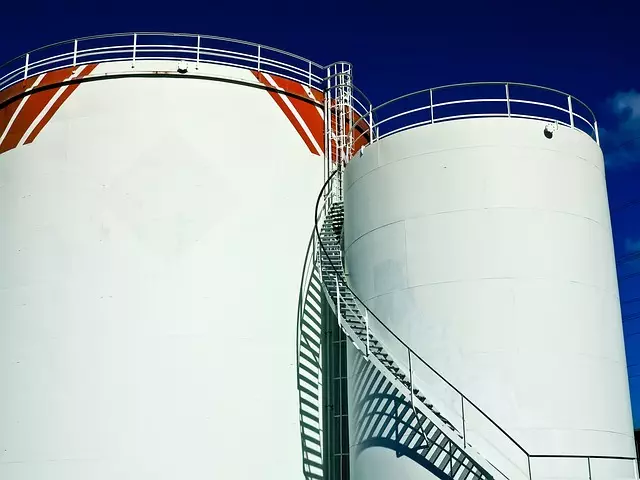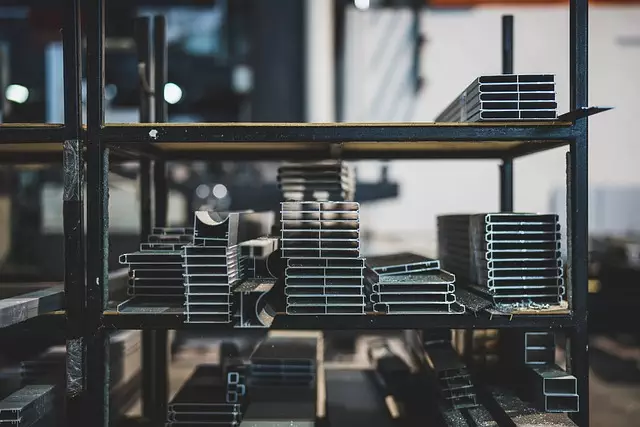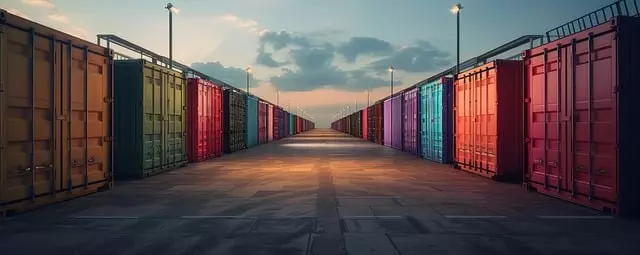2023 marks a pivotal juncture for sustainable industrial packaging, with an escalating emphasis on eco-friendly practices and materials within the sector. Companies are increasingly adopting sustainable industrial packaging solutions as a strategic response to both regulatory pressures and consumer demand for green initiatives. These custom packaging options are engineered to balance product protection with environmental responsibility, utilizing biodegradable or recyclable materials that minimize waste and carbon footprints. The integration of advanced technologies in design and material selection, along with adherence to circular economy principles, enables these packages to be both resilient and sustainable. By embracing these solutions, businesses not only contribute to environmental conservation but also position themselves for regulatory compliance and enhanced brand loyalty. The shift towards a circular economy model in industrial packaging is indicative of a broad industry movement towards responsible environmental stewardship, setting the stage for a transformative era in sustainable manufacturing practices.
recyclable industrial packaging has become a cornerstone of modern manufacturing processes, reflecting an industry-wide shift towards sustainability. This article delves into the transformative role of sustainable industrial packaging solutions, emphasizing custom options that maximize efficiency and environmental responsibility. We explore the innovative materials shaping the future of packaging and offer best practices for designing with recyclability in mind. Through case studies, we examine real-world applications where these strategies have been successfully implemented. Additionally, navigating the evolving regulatory landscape is crucial for businesses to stay ahead in this green revolution. As we look forward, advancements in sustainable industrial packaging technologies promise a greener tomorrow for industries worldwide.
- Maximizing Efficiency and Sustainability with Custom Industrial Packaging Solutions
- The Role of Innovative Materials in Sustainable Industrial Packaging
- Designing for Recyclability: Best Practices in Custom Industrial Packaging
- Case Studies: Successful Implementations of Recyclable Industrial Packaging Systems
- Navigating the Regulatory Landscape of Eco-Friendly Industrial Packaging Solutions
- Future Trends and Advancements in Sustainable Industrial Packaging Technologies
Maximizing Efficiency and Sustainability with Custom Industrial Packaging Solutions
Companies in the industrial sector are increasingly recognizing the need to integrate sustainable practices into their operations, and one critical aspect is the adoption of eco-friendly packaging solutions. Custom industrial packaging not only plays a pivotal role in protecting products during transit but also offers opportunities for enhancing efficiency and sustainability within supply chains. By opting for sustainable industrial packaging options, businesses can significantly reduce their carbon footprint, minimize waste generation, and conserve natural resources. These custom solutions are tailored to meet specific requirements, ensuring that they optimize the protection and presentation of products while incorporating recyclable or biodegradable materials. The use of advanced technologies in design and material selection enables these packages to be both robust enough for industrial handling and kind to the environment. Moreover, by adopting a systematic approach to selecting materials and designing packaging, companies can achieve a harmonious balance between performance and sustainability, contributing positively to their environmental stewardship efforts and potentially benefiting from regulatory incentives or customer loyalty. The transition towards sustainable industrial packaging solutions is not just a responsible choice but also a strategic one that aligns with global sustainability goals and consumer expectations for greener alternatives.
The Role of Innovative Materials in Sustainable Industrial Packaging
The integration of innovative materials has significantly transformed the landscape of industrial packaging solutions, steering them towards sustainability. These advancements are pivotal in addressing the environmental concerns associated with traditional packaging methods. Sustainable industrial packaging options are now designed to minimize the carbon footprint and maximize resource efficiency. For instance, biodegradable and compostable materials are increasingly being used as alternatives to non-recyclable plastics, offering a pathway to zero waste. These eco-friendly materials not only reduce the reliance on fossil fuels but also align with the circular economy principles, ensuring that resources are kept in use for as long as possible.
Custom industrial packaging solutions are evolving to incorporate these sustainable materials without compromising on protection and functionality. The adoption of such materials is a strategic response to growing consumer awareness and stringent environmental regulations. By leveraging cutting-edge technologies and innovative design processes, manufacturers are creating packaging that can be easily recycled or reused, thereby reducing waste and conserving natural resources. This shift towards greener practices in the industrial packaging sector underscores a broader commitment to environmental stewardship and sets a precedent for other industries to follow suit.
Designing for Recyclability: Best Practices in Custom Industrial Packaging
In the realm of sustainable industrial practices, designing for recyclability within custom industrial packaging plays a pivotal role. Businesses increasingly prioritize eco-friendly solutions to minimize their environmental footprint. Sustainable industrial packaging is not merely about reducing waste; it encompasses the entire lifecycle of the package, from material selection to end-of-life disposal. Employing industrial packaging solutions that are designed for recyclability ensures that materials are reclaimed and reused, thereby conserving natural resources and energy. Key factors in this design process include the choice of mono-materials or easily separable components to facilitate sorting, avoiding adhesives or coatings that are difficult to recycle, and creating designs with a minimal number of different materials. Additionally, packaging should be durable enough to protect products during transit but not so robust that it cannot be efficiently recycled. By adhering to these best practices, companies can significantly contribute to a circular economy, where resources are kept in use for as long as possible. Custom industrial packaging solutions that incorporate these principles not only align with regulatory requirements but also enhance brand reputation by showcasing a commitment to environmental stewardship and corporate social responsibility.
Case Studies: Successful Implementations of Recyclable Industrial Packaging Systems
Across various industries, the adoption of recyclable industrial packaging solutions has proven to be a pivotal step towards sustainability. One notable case study is that of a leading beverage manufacturer who transitioned from traditional plastic containers to sustainable industrial packaging made from biodegradable materials. This shift not only reduced the environmental impact of their packaging but also resonated well with eco-conscious consumers, leading to an increase in brand loyalty and market share. The company’s commitment to custom industrial packaging designs allowed for optimal product protection while aligning with their sustainability goals. Another example is a prominent electronics firm that implemented a recyclable packaging program. By incorporating post-consumer recycled content into their packaging, they significantly lowered their carbon footprint and set a benchmark for the industry. This initiative not only showcased their dedication to environmental stewardship but also positioned them as pioneers in sustainable industrial packaging practices. Both case studies highlight the transformative potential of innovative packaging solutions that prioritize sustainability without compromising on functionality or product safety. These examples serve as a testament to the viability and benefits of investing in sustainable industrial packaging, demonstrating that it is not only an environmental imperative but also a strategic business advantage.
Navigating the Regulatory Landscape of Eco-Friendly Industrial Packaging Solutions
Navigating the regulatory framework for eco-friendly industrial packaging solutions involves a complex interplay of environmental standards, compliance requirements, and sustainability goals. Companies must stay abreast of local, regional, and international regulations that govern the disposal and production of packaging materials to ensure their industrial packaging solutions adhere to these guidelines. The shift towards sustainable industrial packaging is not merely a response to regulation but also aligns with consumer demand for environmentally responsible practices. Custom industrial packaging options are increasingly being designed with recyclability and biodegradability at the forefront, which not only reduces environmental impact but also positions businesses as forward-thinking leaders in sustainability. The integration of sustainable materials and innovative design strategies in custom packaging solutions is crucial for compliance, as it minimizes waste and carbon footprint, reflecting a commitment to ecological stewardship within the industry. As such, the landscape of industrial packaging is evolving rapidly, with a focus on circular economy principles that prioritize resource efficiency and material reuse.
Future Trends and Advancements in Sustainable Industrial Packaging Technologies
2023 and beyond promise significant advancements in sustainable industrial packaging technologies, with a strong emphasis on circular economy principles. Innovations in materials science are leading to the development of new types of biodegradable and compostable packaging solutions that can replace traditional plastics. These novel materials not only reduce environmental impact but also align with the growing consumer demand for eco-friendly practices. Companies are increasingly adopting custom industrial packaging options that prioritize recyclability and minimal waste. The integration of smart technology within packaging is another trend, enabling real-time monitoring of package integrity and conditions during transit, thus reducing spoilage and enhancing supply chain efficiency.
Furthermore, the drive towards a greener future has spurred investments in research and development to create more sustainable industrial packaging solutions. These advancements include the use of renewable resources, such as plant-based materials, and the enhancement of existing recycling programs. The focus is on creating packaging that retains its functionality while being easier to recycle or upcycle. The adoption of these technologies not only supports environmental sustainability but also presents a competitive advantage for businesses in various industries. As regulations tighten around single-use plastics, the shift towards sustainable industrial packaging is becoming a critical factor in the long-term viability of companies across the globe.
In conclusion, the transition towards sustainable industrial packaging represents a significant stride for businesses aiming to minimize their environmental footprint. The adoption of custom industrial packaging solutions not only enhances operational efficiency but also aligns with global sustainability goals. Innovative materials and design strategies that prioritize recyclability are pivotal in this shift, offering viable alternatives to traditional packaging methods. The case studies presented demonstrate the practical application and economic benefits of these sustainable practices. As regulations evolve to support eco-conscious industries, companies must stay informed and adaptable. Embracing these advancements positions businesses at the forefront of environmental stewardship. Moving forward, continued innovation in sustainable industrial packaging solutions will be critical for an industry poised to meet the challenges of tomorrow while protecting our planet today.


